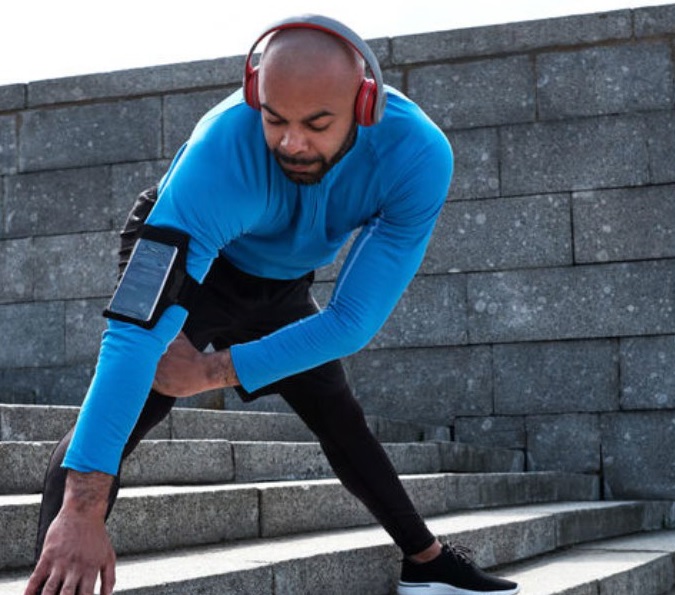The Business & Science of Music & Fitness
Partnership
Sponsored By Feed.fm

How important is music’s role in fitness? Here’s a breakdown, according to Feed.fm, who powers music for top fitness brands
The relationship between fitness and music is inextricable. Feed.fm’s B2B music platform is an integral part of this connection. In 2021, survey findings published on Feed.fm revealed 93% of people were convinced music “makes or breaks a workout.” In addition, 57% of those same individuals surveyed “couldn’t live without” their workout music, and 63% welcomed music curated for them via fitness instructors or apps.
There’s no doubt that music matters, and it’s a sentiment that Feed Media Group (parent company of Feed.fm) COO, President, and Co-Founder, Lauren Pufpaf, stands by wholeheartedly. “Feed.fm has grown exponentially in the last few years because businesses have struggled with licensing popular music for their apps. We enable brands to create incredible apps and digital experiences that use hit music AND we create new revenue opportunities for the artists and rights holders,” Pufpaf told Athletech News.
Why music matters in fitness.
Music keeps fitness enthusiasts engaged and focused on the exercises at hand. People are more likely to keep up with their workouts, especially if they hear their favorite song or artist while slogging away at the gym or getting fit at home.
Feed.fm powers music for the world’s leading brands including The Beachbody Company, Mayo Clinic, Mirror, Nautilus, and Tonal. “Feed.fm customers who integrate in-app music increase retention. Their customers are more than two times as likely to return again the next month (retention goes up 2x). At the 90 day mark, it’s actually 3x. With the right music, you can literally increase your customer retention quarter over quarter by 3x. Many fitness businesses are subscription-based and retaining more customers has an immediate impact on their bottom line,” states Pufpaf.
The right music for the right workout at the right time.
It’s not just about making a playlist, curating the right music is a finely-tuned art . . . and context is key.
Curating music for a fitness app is different from creating a list for an in-person class where you can get a read on how participants are vibing with the music selection, making real-time adjustments to selections.
Feed.fm takes a client-first approach and creates a profile of a fitness app’s core users. Next, it considers the workout and the intent of the fitness instructor, such as intensity levels, before seeking out the tracks to include. Curation isn’t a set-it-and-forget process, data is analyzed over time to further target the music selections to the preferences of their clients’ users.
Pufpaf denotes the difference between curating music, which is about “the right music for the right workout at the right time” in fitness, versus licensing music, which is about procuring tracks, streaming them legally, and making sure artists get paid.
It’s expensive using music if you don’t know how.
When companies neglect to account for music licensing, they can be held responsible for copyright infringement. The bigger the company, the more exposure it has to large damage claims. Even the smallest companies are at risk. “You have to be properly licensed to use music, period,” says Jeff Yasuda, CEO and co-founder of Feed Media Group.
Music licensing is complex. It’s important to have legal representation and know the right people. Musical content is incredibly valuable and all rights holders deserve to be paid equitably — the trick for many businesses is knowing where to start.
But, you don’t have to go it alone. Feed.fm specializes in managing the intersection of music licensing and tech, removing red tape so its clients don’t have to worry about the complexities.
“You can go out and learn the rules and regulations and one-by-one communicate with rights holders to sort it all out,” says Yasuda, adding, “the benefit to Feed.fm is that we are doing this every day, we have the relationships in place. It’s a plug-and-play solution that allows you to do what you do best.”
Advice for companies struggling with music licensing.
The least expensive option is not using music, but you’re likely not going to create the user experience you want. You can start with stock or production music, which is affordable but won’t have the same ability to motivate your users.
“Our fitness curators focus mostly on songs people know and love, sprinkling in a smaller amount of lesser-known tracks,” Pufpaf explains. “Our curation teams track user feedback closely and optimize music experiences based on data. They work hard to drive discovery of new artists and watch trends to keep things fresh.”
The most expensive thing you can do is use popular music illegally. With the heavy cost of potential copyright infringements and ever-changing music licensing laws to consider, Feed Media Group works around the clock to make sure Feed.fm fitness clients are in compliance and resting easy with full indemnification.
“Everything that we put on our customers’ music stations is pre-cleared for use. We take care of all of the licensing, reporting, and payments. We also offer tried and true SDKs, so you can add a fully compliant music player to your app with minimal coding. And, we give you full analytics to identify user trends.”
In closing, Pufpaf says “it’s all about helping our customers and their customers experience the power of music, legally.”
2022 Fitness Music Trends To Look Out For:
- Remixes — “We are seeing more fitness-specific remixes. Artists and labels are realizing the potential for streaming in the fitness space.”
- “Disco-flavored” pop music — “The fact that pop music is on the upswing, as far as tempo goes, and taking some nods from disco makes it very fitness-friendly.”
- Trap music — “Trap music has made a huge splash in influencing every genre and it’s sometimes challenging to curate with. [But] when you’re doing asynchronous workouts like strength training, trap music can be great for that.”
- Tik Tok — the beloved social media app will “continue to be an influence.” “We’re using shorter tracks and incorporating some of those viral hits that people are discovering on Tik Tok.”
- Corporate wellness expansion — “Corporate culture is evolving and changing and fitness apps are poised to expand into corporate wellness solutions.”
More 2022 fitness music trends, per Feed.fm, can be found here: https://blog.feed.fm/5-fitness-music-trends-tips-for-2022



